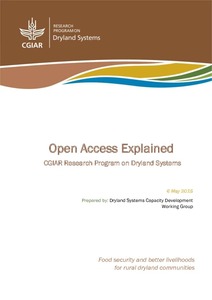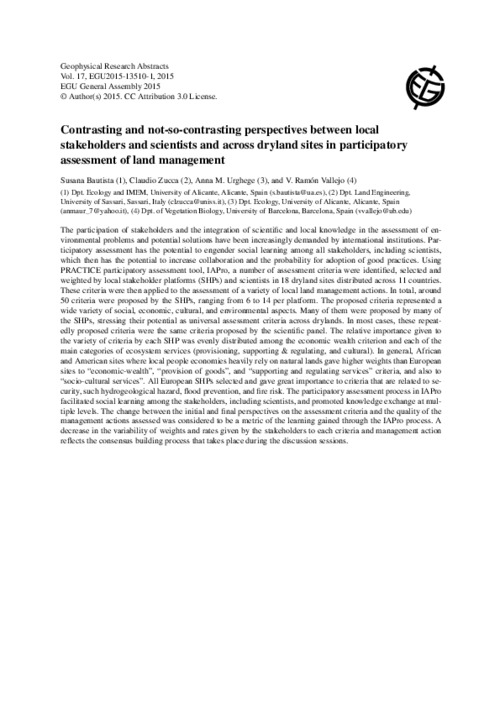Location
The International Center for Agricultural Research in the Dry Areas (ICARDA) was established in 1977. It is one of 15 such centers supported by the CGIAR. ICARDA’s founding mandate to promote agricultural development in the dry areas of developing countries remains highly relevant today.
ICARDA works with a tight focus on the problem-solving needs of resource-poor farmers, achieving this through the in-field delivery of its research outputs. Although global food production has increased by 20 per cent in the past decade, food insecurity and poverty remain widespread, while the natural resource base continues to decline.
International research centers such as ICARDA, which have helped drive previous improvements, continue to deliver new technologies to support sustainable growth in agriculture, and crucially, to work with a wide range of partners to accelerate the dissemination of these technologies.
ICARDA’s biggest strength is its staff – 600 highly skilled men and women from 32 countries. Our research and training activities cover crop improvement, water and land management, integrated crop-livestock-rangeland management, and climate change adaptation.
Other interventions include:
- Water harvesting - supplemental irrigation and water-saving irrigation techniques
- Conservation agriculture methods to reduce production costs and improve sustainability
- Diversification of production systems to high-value crops – horticulture, herbal and medicinal plants
- Integrated crop/rangeland/livestock production systems including non-traditional sources of livestock feed
- Empowerment of rural women – support and training for value-added products.
The ICARDA genebank holds over 135,000 accessions from over 110 countries: traditional varieties, improved germplasm, and a unique set of wild crop relatives. These include wheat, barley, oats and other cereals; food legumes such as faba bean, chickpea, lentil and field pea; forage crops, rangeland plants, and wild relatives of each of these species.
ICARDA’s research portfolio is part of a long-term strategic plan covering 2007 to 2016, focused on improving productivity, incomes and livelihoods among resource-poor households.
The strategy combines continuity with change – addressing current problems while expanding the focus to emerging challenges such as climate change and desertification.
We work closely with national agricultural research systems and government ministries. Over the years the Center has built a network of strong partnerships with national, regional and international institutions, universities, non-governmental organizations and ministries in the developing world and in industrialized countries with advanced research institutes.
THE ‘DRY AREAS’
Research and training activities cover the non-tropical dry areas globally, using West Asia, North Africa, Central Asia and the Caucasus as research platforms to develop, test, and scale-out new innovations and policy options.
Dry areas cover 41 per cent of the world’s land area and are home to one-third of the global population. About 16 per cent of this population lives in chronic poverty, particularly in marginal rainfed areas. The dry areas are challenged by rapid population growth, frequent droughts, high climatic variability, land degradation and desertification, and widespread poverty. The complex of relationships between these challenges has created a "Poverty Trap."
Members:
Resources
Displaying 276 - 280 of 431Agenda for Options by Context Training for ICRAF DryDev staff
The present document consists of the official Agenda for the Options by Context Training, held in Kenya, 25-29 May 2015. The event aimed to:
1. Familiarise all ICRAF DryDev staff with the OxC, R in D and planned comparisons approaches being used.
2. Test and revise processes for implementing the approaches.
3. Plan how the methods will be taken 'to scale' in each country.
4. Produce OxC matrices and planned comparison designs for Kenyan sites.
Contrasting and not-so-contrasting perspectives between local stakeholders and scientists and across dryland sites in participatory assessment of land management
Poster presentation. Book of abstracts. 2015 annual conference of European Geosciences Union (EGU).
The participation of stakeholders and the integration of scientific and local knowledge in the assessment of environmental
problems and potential solutions have been increasingly demanded by international institutions. Participatory
assessment has the potential to engender social learning among all stakeholders, including scientists,
which then has the potential to increase collaboration and the probability for adoption of good practices. Using
Agenda of Group meetings on women’s role in use and management of water resources in Turkistan region - russian
Agenda of Group meetings on women’s role in use and management of water resources in Turkistan region - russian
Potential legume alternatives to fallow and wheat monoculture for Mediterranean environments
Growing populations and intensification of land-use in West Asia and North Africa (WANA) are prompting
a need for viable alternatives to fallow and cereal mono-cropping systems common in dry areas of this region. The
sustainability and economic viability of such rotations can only be assessed accurately by using long-term trials.Atwo-course
rotation experiment was established in 1986 in north-eastern Syria, comparing yields and profitability of wheat (Triticum







